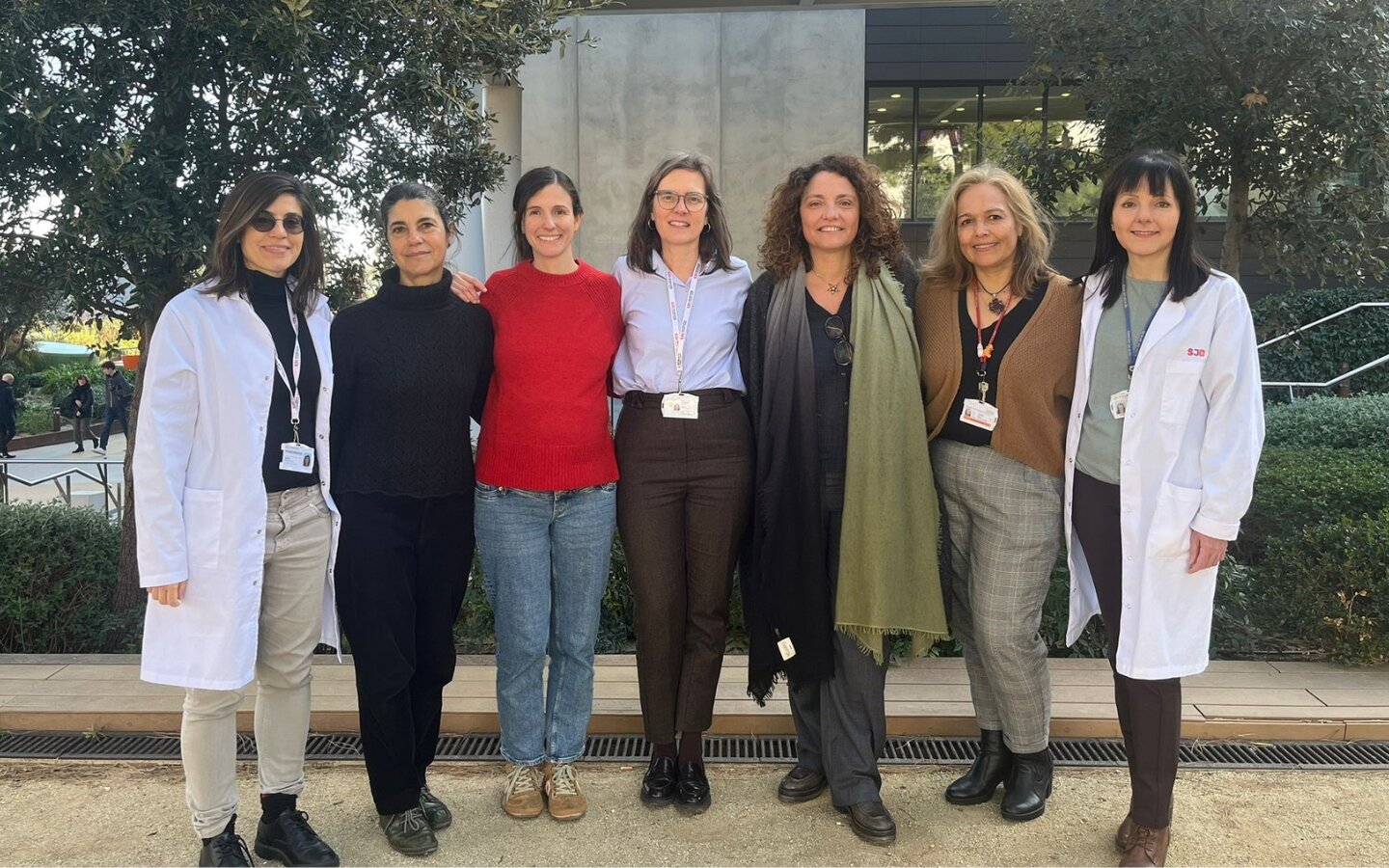Neonatal Brain
Research Program
Leaders
Where we are
 SJD Barcelona Children's Hospital
SJD Barcelona Children's Hospital
Related websites
The research mission of the Neonatal Brain group is to find answers to the questions that arise in clinical practice and to generate new knowledge on brain traumas/diseases during the foetal, perinatal or neonatal period that imply a major impact on the health and development of the infant. The ultimate goal of our research activity is to help reduce the health burden associated with foetal, perinatal or post-natal neurological diseases.
Our research is patient-centred and particularly focused on identifying clinical, biochemical, neurophysiological and neuroimaging diagnostic/prognostic biomarkers, as well as therapeutic aspects of acquired brain damage during birth or in the neonatal period. Our main lines of inquiry focus on perinatal hypoxic-ischaemic brain injury, cerebral arterial stroke, CNS maturation and acquired infection in the preterm infant as well as foetal brain damage of inflammatory-infectious aetiology.
Our group leader has been a member of CIBERER (Centre for Biomedical Network Research on Rare Diseases) since 2007.
Research lines
- Perinatal hypoxic-ischaemic encephalopathy (Principal investigator: A. García-Álix).
- Neonatal arterial ischaemic stroke (NAIS), from aetiological and pathogenic mechanisms to diagnostic-prognostic biomarkers (Principal investigator: A. García-Álix).
- Brain maturation, and how it could be affected by acquired brain injury (Principal investigator: T Agut).
- Intrauterine foetal infection, establishing inflammatory biomarkers in maternal, foetal and neonatal fluids to identify new diagnostic biomarkers and to predict neurodevelopmental risks (Principal investigator: Dr A. Alarcón).
Scientific objectives
- To develop and validate biochemical, neurophysiological, neuroimaging or metabolomic diagnostic-prognostic biomarkers for neurological diseases, expressed or with onset during foetal or neonatal life.
- To characterise the genes implicated in neonatal arterial ischaemic stroke.
- To develop and validate an automated tool for the classification of neonatal arterial ischaemic strokes which, after establishing the location and extent of lesions, would predict possible long-term neurological impairment, on a case-by-case basis, from the knowledge attained from lesion-behaviour mapping (voxel-based lesion-symptom mapping).
- To generate a morphometric atlas of brain development using ultrasound technology to qualify brain maturation, and to develop an atlas of cerebral vasculature using MRI.
- To characterise both phenotypic and neuroevolutionary aspects in neonates with acquired brain injuries.
- To estimate the health burden of the most prevalent neonatal neurological disorders.
Area/Field of expertise
The research carried out by our group forms part of the study of the clinical, biochemical, molecular and therapeutic aspects of neonatal neurological disorders originating during the foetal phase, at birth or during the neonatal period.
The group includes neonatologists specialising in neonatal neurology, who liaise closely with neuroneonatologists from other centres and in our area, and with neuropsychologists, neuropaediatricians, physicists and biochemists. We use state-of-the-art biochemical marker and neurophysiological monitoring and neuroimaging technology.

Group members
-

Jefe de Grupo
-

Nuria Carreras Blesa
Investigador post-doc
-

Investigador
-

Jefe de Grupo
-

Investigador
-

Maria del Mar Velilla Aparicio
Investigador
-

Investigador
-

Melissa Andrea Fontalvo Acosta
Ayudante de investigación
Last Publications
- Regalado M, Carreras-Blesa N, Mata-Miquel C, Oliver A, Lladó X and Agut-Quijano T Automatic Segmentation of Sylvian Fissure in Brain Ultrasound Images of Pre-Term Infants Using Deep Learning Models ULTRASOUND IN MEDICINE AND BIOLOGY . 51(3): 543-550.
- Licht-van der Stap RG, de Vries LS, Alarcon A, Govaert P and Steggerda SJ Cranial ultrasound in neonatal brain infections DEVELOPMENTAL MEDICINE AND CHILD NEUROLOGY . : .
- Charach, R, Pérez-Cruz M, Masoller-Casas N, Illa-Armengol M, Monterde, E, Martínez-Crespo, JM, Borrell, A, Gómez-Chiari M, Rebollo M, Borregán M, Gómez, O and Eixarch, E Systematic Ultrasound Evaluation of Olfactory Sulci in Fetuses with Congenital Heart Defects: A Clue for CHARGE Syndrome Diagnosis FETAL DIAGNOSIS AND THERAPY . : .
Projects
- Project name:
- Evaluación de un nuevo test diagnóstico rápido para la cuantificación de biomarcadores pronósticos en el triaje del paciente crítico y la mejora de la superviviencia neonatal e infantil (ACROBAT-Critical)
- Leader
- Ana Alarcon Allen
- Funding entities:
- Instituto de Salud Carlos III (ISCIII)
- Code
- PI23/00103
- Starting - finishing date:
- 2024 - 2026
- Project name:
- Evaluation of a new point-of-care risk-stratification tool based on quantification of prognostic biomarkers for the screening of the very sick patient to improve neonatal survival
- Leader
- Ana Alarcon Allen
- Funding entities:
- Sociedad Española de Neonatología
- Code
- PCP00386
- Starting - finishing date:
- 2023 - 2025
- Project name:
- SGR 2022-2024_Grup Cervell Neonatal (GCN)
- Leader
- Thais Agut Quijano
- Funding entities:
- Agaur - Agència de Gestió d'Ajuts Universitaris i de Recerca
- Code
- 2021 SGR 01505
- Starting - finishing date:
- 2022 - 2025
Theses
-
Sensory development in the newborn infant: Modulation by early life experience and the impact of brain injury
- Institution
- University of Oxford, Nuffield Department of Clinical Neurosciences, Medical Sciences Division
-
Caracterización de pacientes pmm2-cdg: espectro fenotípico y correlación molecular
- Author
- Martinez Monseny, Antonio F
- Institution
- UNIVERSIDAD DE BARCELONA
-
Disfunción multiorgánica en el recién nacido con encefalopatía hipóxico-isquémica en la era de la hipotermia terapéutica
- Author
- Alsina Casanova, Miguel Mª
- Institution
- UNIVERSIDAD DE BARCELONA
News
-
Discussing photonics tools for pediatrics in the 3rd BMPN annual meeting
The Barcelona Medical Photonics Network celebrated the third edition of its annual meeting, gathering experts focuses discussion on photonic techniques to improve diagnostics and treatment personalization in pediatrics.
-
Longer breastfeeding duration leads to larger gray matter volume at age 10 years
The Institut de Recerca Sant Joan de Déu (IRSJD) and the Institut d'Investigació Biomèdica Sant Pau (IIB Sant Pau) have led the largest-ever study with brain images of children between 9 and 11 years old, relating the duration of breastfeeding to a larger volume of cortical gray matter in this age bracket. The study has been published in the Journal of Child Psychology and Psychiatry.

 SJD Barcelona Children's Hospital
SJD Barcelona Children's Hospital